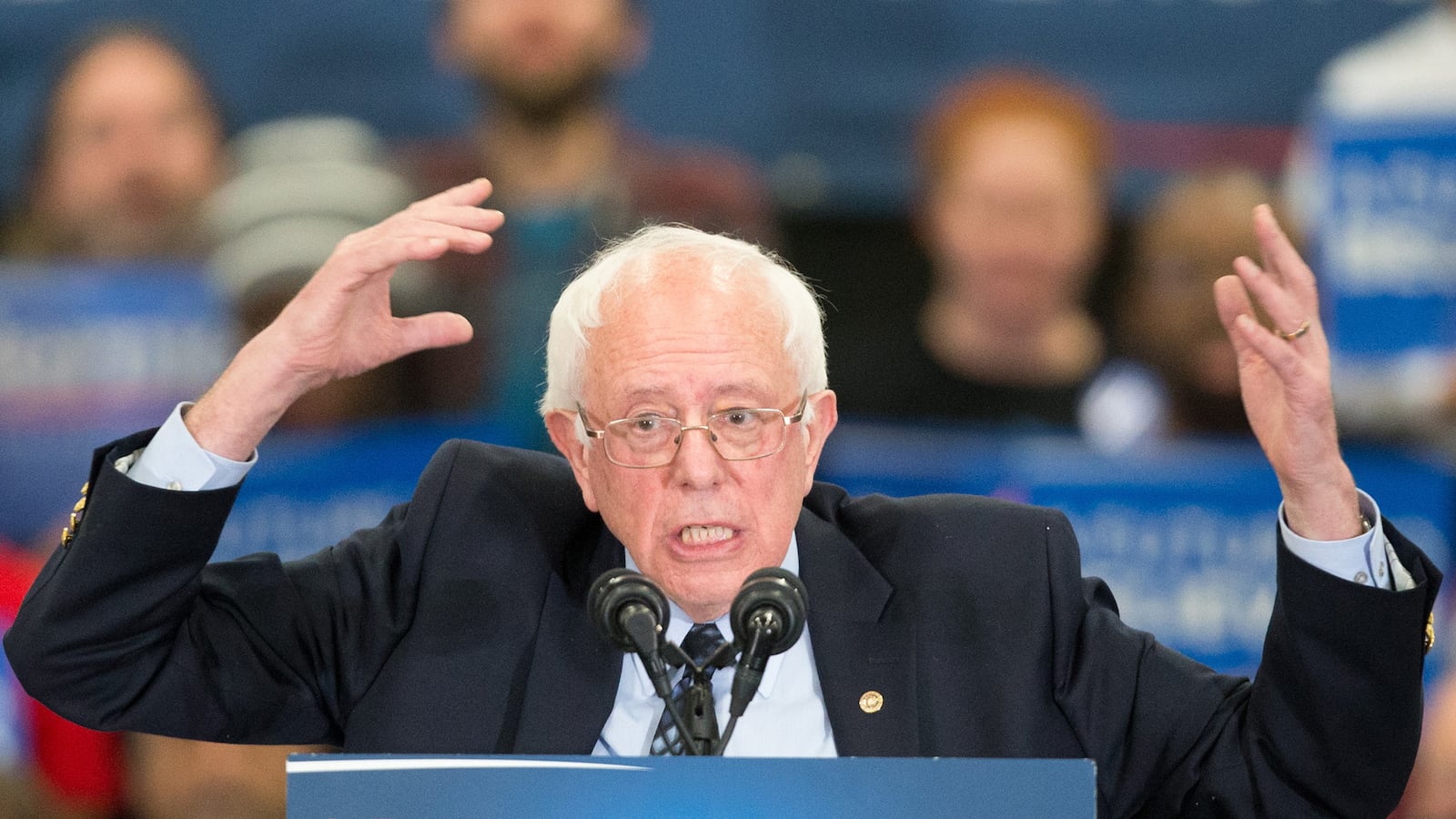If you happen to see an older white gentleman walking down the road, cursing the asphalt, with a shovel lobbed over his shoulder, it’s probably Bernie Sanders. After picking up endorsements from local politicians in Michigan, the Vermont senator should have been basking in the spate of wins he racked up on Super Saturday. Instead, the Democratic presidential candidate managed to dig himself even further into a trench during a Sunday evening debate in Flint.
“When you are white, you don’t know what its like to be living in a ghetto,” Senator Sanders asserted. “You don’t know what it’s like to be poor.”
It was a tough moment for Sanders, who did not appear to recognize the implication of his words or that they might result in repercussions from black and white voters alike. Had he known, Sanders might have explained that black and white poverty do operate differently. Black poverty tends to be “more isolating and concentrated,” wrote Emily Badger for The Washington Post.
“It extends out the door of a family’s home and occupies the entire neighborhood around it, touching the streets, the schools, the grocery stores.”
The opposite is largely true for poor whites, who “in most major metropolitan areas, are spread out.”
Those spatial factors, in additional to the complications of racial discrimination, complicate how we approach poverty as a domestic issue. But Sanders did not say that. He said, without blinking an eye, that white people “don’t know what it’s like to be poor.”
The fact is that a clear majority of those who receive public assistance in this country are white.
The Supplemental Nutrition Assistance Program (SNAP) is 40.2 percent white, according to data from the U.S. Department of Agriculture. Just over 25 percent are black and another 10 percent are Hispanic.
His assertions, however, were problematic for another reason. Despite the finding of The Washington Post study, there remain large pockets of white people living in deeply poor neighborhoods—communities where poverty stretches out onto the street and into the schoolyard, where payday lenders and buy here-pay here car lots are more prevalent than banks. As Sanders stood on that gloriously lit stage answering audience and moderator questions, one of those communities lay right outside the auditorium doors.
It was not as if Sanders was standing in the middle of South Central Los Angeles or Compton, largely African-American and Latino communities. He was not in East St. Louis, Illinois, which is 98 percent black, or “The Bluffs” of Atlanta. Sanders was in Flint, Michigan, a rust-belt city besieged with pervasive poverty where both black and white residents have subsisted on lead-poisoned water and multiple layers of government that failed them all.
You see, if Sanders wanted to see white people living in a “ghetto”—white people who are living with long-term unemployment under the strictures of environmental injustice, economic flight, and crumbling schools—he needed only peer out of the window of his SUV along the drive to the CNN debate.
Flint has a per capita income is less than $16,000 and falling. While the population is just over 50 percent black, 41 percent of its residents are white. Those are knowable facts for anyone who cares enough to know them.
Sanders spent the day repeatedly trying to clarify his statements about race and poverty, only to widen the chasm in the ground beneath him. Rather than walk them back, Sanders seemed to double-down on the notion that poverty is exclusively a black problem.
“What I meant to say,” Sanders told an NBC News reporter, “is when you talk about ghettos, traditionally what you’re talking about is African-American communities.”
Without question, Sanders has mounted what he calls a revolution built to eradicate income inequality and unwind a rigged economic system that favors wealthy oligarchs. However, he appears increasingly tone deaf when it comes expanding his coalition to include non-white voters and, unfortunately, the notion that “ghetto” is a euphemism for “black” opened the window on a third problem for the Sanders camp.
In addition to the fact that “ghetto” is used as a derisive term in every economic strata of black culture, the deeper problem for him and the campaign is that the 74-year-old Brooklyn native consistently demonstrates a disconnection from black people and the issues they care about most. Even more curious are the early roots of the term when it was applied to Jews living in squalor in various European cities, including Warsaw. However, watching Sunday’s debate, one would think that African Americans care only about poverty, incarceration and environmental justice.
One would believe that there is no black middle class, that we do not own homes or occupy executive offices. One would have to believe that there are no African-American college graduates who are still worried that they cannot afford the same for their children. One would think that we are not small-business owners, college professors, police officers or postal workers. Yes, some of us are worried about hailing a taxicab in New York. But, as NBC’s Al Roker will tell you, wealth is no barrier to discrimination.
“What I meant by that is, I think that many white people are not aware of the kinds of pressures and the kind of police oppression that sometimes takes place within the African-American community,” Sanders said at another campaign stop Monday. “In the African-American communities, you have police officers abusing people, and that is the point that I tried to make.”
That he seems to view black people solely through the lens of poverty and criminal justice reform is as problematic as his near constant fallback on Wall Street as chief culprit on almost every issue. His messaging, though somewhat improved in recent weeks, inextricably ties questions of race to economic issues—as if solving the latter would eradicate the former. That he is dismissive of those criticisms may be one reason why he has not been able to draw any significant support from black voters.
For his part, Sanders is quick to say that he will not be “lectured” about questions of race and inequality.
Consistently, as he did from a lectern in Flint, Sanders uses his work during the civil rights movement as a calling card. Sanders, who has represented part or all of predominantly white Vermont for the full of his political career, has spent recent months building relationships in the African-American community. A cache of black campaign surrogates passionately took to the streets and the airwaves on his behalf and Sanders says no other presidential candidate has talked about poverty more than he has. He points to his policy proposals as proof of his commitment.
But, lest anyone question his domestic policy agenda as it pertains to black people, Sanders and his supporters reflexively point out that he was once arrested for protesting segregated schools.
“In 1963, and an important day for me,” Sanders told the debate audience Sunday night, “I went to the March of Washington led by Dr. King for jobs and freedom.”
For many, that answer and others ring hollow and serve only to validate the assessment that Sanders simply does not “get it.”
“I don't want to be lectured about talking about poverty, whether it’s white, black, Latino,” he said Monday.
Maybe that is the problem. Maybe it’s time for Sanders to sit down and listen to his campaign advisers and surrogates. With the primary campaign in full swing, it’s past time for him to put down the shovel and back away from the hole.






